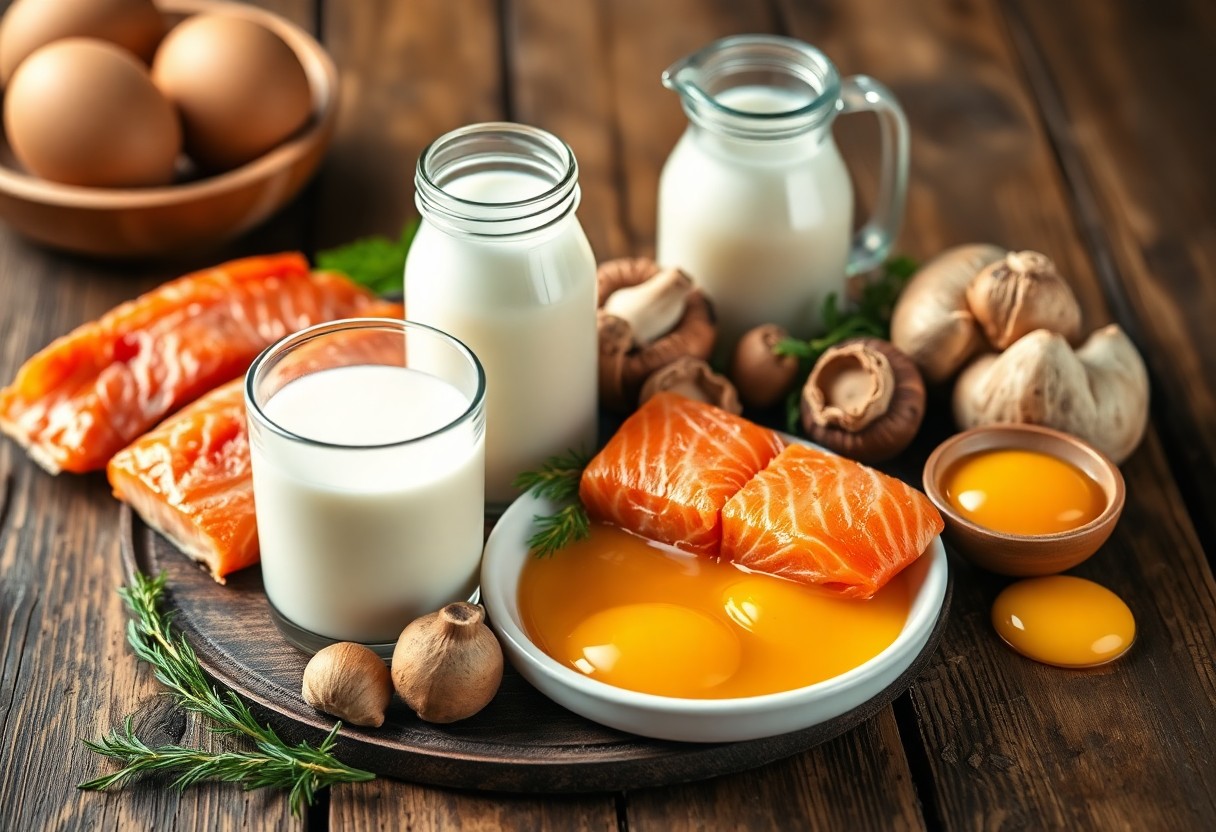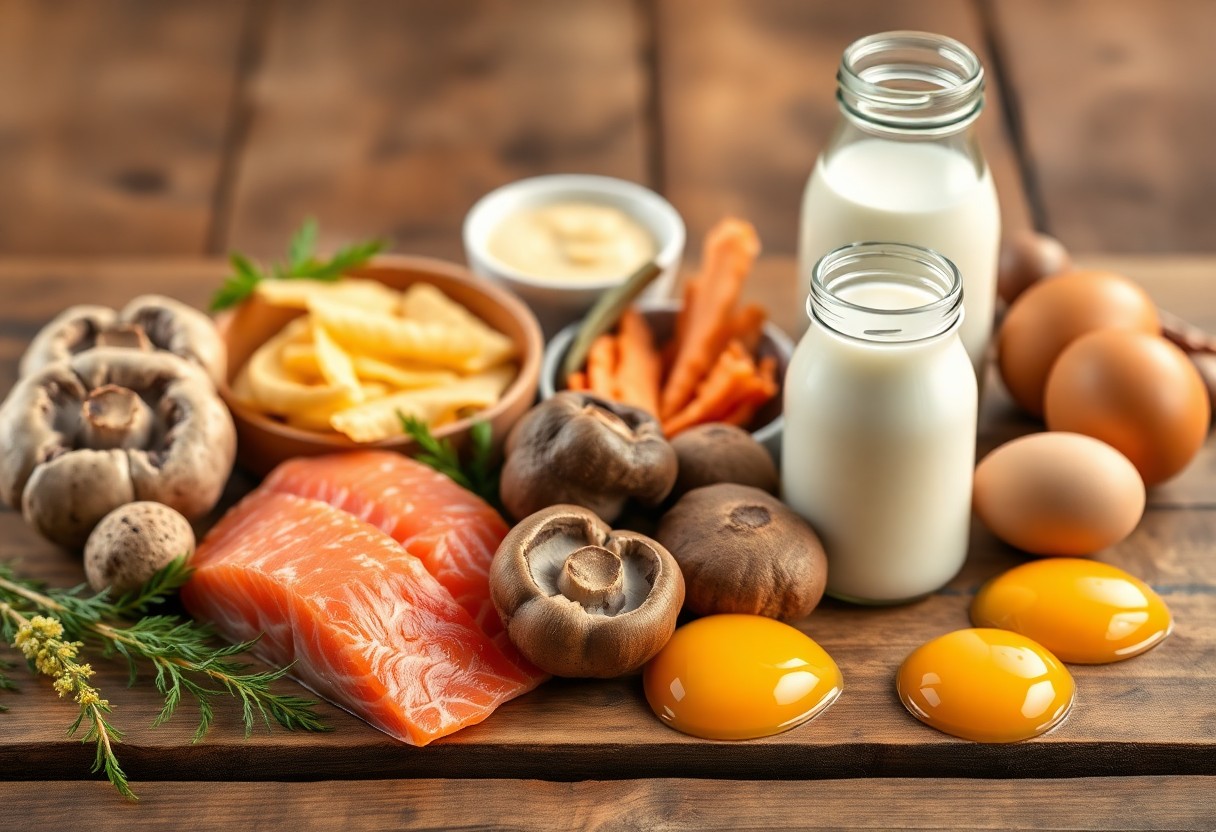Foods rich in Vitamin D are crucial for maintaining strong bones and overall health. You may not realize that this vital nutrient plays a significant role in calcium absorption and bone metabolism. By incorporating natural sources of Vitamin D into your diet, you can support your bone density and ensure that your skeletal system stays robust. In this post, you’ll discover the best foods to boost your Vitamin D intake, helping you achieve healthier bones and a stronger body.
Importance of Vitamin D for Bone Health
As you prioritize your bone health, understanding the role of vitamin D becomes vital. This vitamin not only supports the overall function of your body but also plays a vital part in maintaining strong and healthy bones. Adequate levels of vitamin D allow your body to effectively utilize calcium, leading to enhanced bone formation and reduced risk of fractures. Incorporating vitamin D-rich foods into your diet can be a significant step in promoting lifelong bone health.
Role in Calcium Absorption
An effective calcium absorption process is largely dependent on adequate vitamin D levels in your system. When vitamin D is present, your intestines can absorb calcium more efficiently from the foods you consume. This enhanced absorption is critical for maintaining appropriate calcium levels in your blood, ensuring that your bones receive the vital nutrients they need to remain strong and resilient.
Impact on Bone Density
Behind the scenes, vitamin D significantly influences your bone density. Higher vitamin D levels are associated with better bone mineralization, which in turn increases the density and strength of your bones. Ensuring sufficient vitamin D intake not only helps in bone growth during childhood and adolescence but also plays a protective role in reducing age-related bone loss.
Vitamin D is vital for maintaining bone density throughout your life. Low levels of this vitamin can lead to weakened bones, making them susceptible to fractures and osteoporosis. By ensuring you receive adequate vitamin D, whether through sun exposure, diet, or supplements, you are actively working to optimize your bone health and reduce the risk of bone-related diseases as you age. Incorporating vitamin D-rich foods into your daily routine can be an effective strategy to support your overall bone density and strength.
Best Natural Food Sources of Vitamin D
Now that you understand the importance of Vitamin D for maintaining strong bones, it’s vital to know the best natural food sources that can help you boost your levels. Incorporating these foods into your diet can effectively enhance your bone health and overall well-being.
Fatty Fish
Best sources of Vitamin D include fatty fish such as salmon, mackerel, and sardines. These nutrient-rich fish not only provide you with ample amounts of Vitamin D but also deliver healthy omega-3 fatty acids, supporting both bone and heart health.
Fortified Foods
Fortified foods are another excellent way to increase your Vitamin D intake, especially for those who may have limited sun exposure or dietary restrictions. Common fortified options include dairy products, orange juice, and cereals that have added Vitamin D, making it easier for you to meet your daily requirements.
Fish is often fortified with Vitamin D to provide additional benefits. By choosing fortified options, you can easily supplement your diet, ensuring that you receive adequate amounts of this vital nutrient, which plays a significant role in calcium absorption and bone development.

Other Sources of Vitamin D
For those seeking to enhance their vitamin D intake, several alternative sources complement dietary staples. Apart from fortified foods and fatty fish, natural options like egg yolks and mushrooms provide significant benefits. Incorporating these into your diet can support your bone health and boost your vitamin D levels effectively.
Egg Yolks
Between their rich flavor and nutritional profile, egg yolks are excellent sources of vitamin D. Each yolk contains small amounts of this crucial nutrient, making them a tasty addition to your meals. Including eggs in your diet can help you increase your overall vitamin D intake.
Mushrooms
One unconventional yet effective source of vitamin D is mushrooms. Particularly, varieties exposed to sunlight, such as maitake and shiitake, can synthesize vitamin D just like human skin. This makes them a valuable option for those following a plant-based diet or looking for diverse sources of nutrients.
A key benefit of mushrooms is their ability to provide not only vitamin D but also other important nutrients, including fiber and antioxidants. By incorporating mushrooms into your meals, you can enjoy their earthy flavors while supporting your overall health. Try adding them to stir-fries, salads, or soups to reap the benefits.

Daily Recommended Intake
Many people are unaware of the daily recommended intake of Vitamin D necessary for maintaining strong bones. For adults, the recommendation is generally 600 to 800 IU, depending on your age and life stage. You can learn more about this from comprehensive resources, such as Calcium/Vitamin D Requirements, Recommended Foods & .... Ensuring you meet these levels can significantly benefit your bone health.
Age-Specific Guidelines
AgeSpecific guidelines for Vitamin D intake vary to meet the needs of different life stages. Infants require about 400 IU, toddlers up to 600 IU, and adjustable levels are recommended for adults and seniors. This tailored approach ensures that you are receiving the appropriate amount necessary for optimal bone strength at any age.
Factors Affecting Requirements
By being aware of various factors affecting your Vitamin D requirements, you can better tailor your intake. These factors may include:
- Your age
- Your skin color
- Your geographical location
- Seasonality and sun exposure
Knowing your individual needs can help you achieve the appropriate Vitamin D levels for maintaining healthy bones.
But additional details regarding your Vitamin D needs include lifestyle factors and health conditions that may influence requirements. Consider the following:
- Your dietary habits
- Existing medical conditions
- Any medications you may be taking
Knowing these factors allows you to make informed decisions about your Vitamin D intake for better bone health.
Risks of Vitamin D Deficiency
Despite the importance of vitamin D for bone health, many people are at risk of deficiency, particularly those with limited sun exposure or insufficient dietary intake. The long-term effects can be severe, leading to weakened bones and conditions such as osteoporosis. To learn more about Natural Sources of Vitamin D and Calcium, it’s necessary to ensure you incorporate these nutrients into your diet.
Symptoms and Health Implications
Across various populations, vitamin D deficiency can manifest through a multitude of symptoms, including fatigue, muscle weakness, and bone pain. Additionally, prolonged deficiency can result in health implications such as increased susceptibility to fractures and a decline in overall bone health.
Who is at Higher Risk?
Risks for vitamin D deficiency are heightened in certain groups, including the elderly, individuals with darker skin, and those living in northern latitudes, where sunlight exposure is minimal. Additionally, people with certain medical conditions that affect fat absorption and those who follow a strict vegetarian or vegan diet may also find it more challenging to get sufficient vitamin D.
Indeed, if you belong to any of these groups or have lifestyle factors limiting your sun exposure, you should be particularly vigilant about ensuring your vitamin D levels are adequate. Regular testing and speaking with a healthcare provider about supplementation may be beneficial to support your bone health effectively.
Tips for Enhancing Vitamin D Intake
After learning about vitamin D-rich foods, you can further enhance your vitamin D intake with these practical tips:
- Incorporate fatty fish into your meals.
- Opt for fortified dairy products or plant-based alternatives.
- Consider taking a vitamin D supplement after consulting your healthcare provider.
- Get outside for a short walk in the sunlight several times a week.
Any adjustments you make can greatly improve your bone health. For more information, check out The Scoop: Nutrients for Bone Health.
Dietary Strategies
Beside focusing on specific foods, you should plan your meals to include a variety of vitamin D sources. This can be achieved by combining different foods such as eggs, fortified cereals, and mushrooms, ensuring you're meeting your daily requirements. Pairing vitamin D sources with foods rich in healthy fats can also improve absorption and provide additional nutrients for your bones.
Safe Sun Exposure Practices
Before soaking up the sun, it’s important to know how to do it safely to boost your vitamin D levels. Aim for about 10 to 30 minutes of midday sun exposure a few times a week, depending on your skin type and location. Always avoid sunburn and consider the use of sunscreen based on your exposure duration to protect your skin while still reaping the benefits of natural sunlight.
Indeed, practicing safe sun exposure is vital for integrating adequate vitamin D into your routine. The sunlight converts compounds in your skin to vitamin D, which is important for bone health. For maximum benefit, expose larger skin areas by wearing fewer clothes, but be mindful of the risks. A balance between sun exposure and skin protection will help you maintain healthy vitamin D levels without compromising your skin’s health.
Final Words
On the whole, incorporating vitamin D-rich foods into your diet is crucial for maintaining strong bones and overall health. By choosing natural sources like fatty fish, egg yolks, and fortified foods, you can enhance your vitamin D intake effectively. Additionally, spending time outdoors will help your body produce this important nutrient naturally. Prioritizing these dietary options not only supports bone strength but also boosts your immune system and overall well-being. Make these vitamin D foods a staple in your meals to promote a healthier lifestyle.
FAQ
Q: What are the best natural food sources of Vitamin D?
A: Some of the top natural food sources of Vitamin D include fatty fish such as salmon, mackerel, and sardines. Other sources include cod liver oil, fortified dairy products like milk and yogurt, egg yolks, and certain mushrooms exposed to UV light. These foods can greatly contribute to your daily intake of Vitamin D.
Q: How does Vitamin D support bone health?
A: Vitamin D plays a vital role in calcium absorption in the gut. It helps maintain adequate calcium and phosphate levels in the blood, which are imperative for maintaining strong bones and teeth. Without sufficient Vitamin D, bones can become thin, brittle, or misshapen, leading to conditions such as osteoporosis.
Q: How can I increase my Vitamin D levels through my diet?
A: To increase your Vitamin D levels through diet, incorporate more Vitamin D-rich foods into your meals. Aim for servings of fatty fish a few times a week, choose fortified foods when possible, and consider adding egg yolks and mushrooms to your recipes. Sun exposure, in addition to diet, can also help your body produce Vitamin D naturally.
Q: What is the recommended daily intake of Vitamin D for adults?
A: The recommended daily allowance (RDA) of Vitamin D for most adults is 600 to 800 International Units (IU) per day, depending on age and other factors. It’s important to check with a healthcare professional to determine the appropriate amount for your specific needs, especially if you have health concerns or limited sun exposure.
Q: Are there any risks associated with excessive Vitamin D intake?
A: Yes, excessive intake of Vitamin D can lead to toxicity, which may cause symptoms such as nausea, vomiting, weakness, and serious complications like kidney damage. It's important to consult with a healthcare provider before starting any supplements, particularly if you're considering doses higher than the recommended daily allowance.

0 Comments